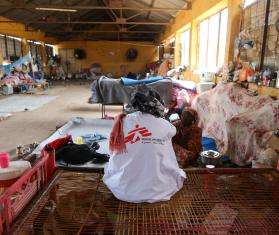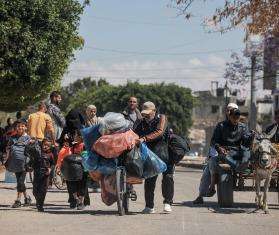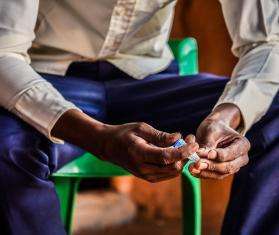New York, December 16, 2020—Hurricanes Eta and Iota have left more than 250,000 people in Honduras with limited access to health care services, but the international response remains insufficient to respond to the urgent needs, said the international medical humanitarian organization Doctors Without Borders/Médecins Sans Frontières (MSF). Almost 50 percent of the health centers in Honduras are now closed, damaged, or experiencing interruption to their services. MSF calls on the international community to increase the emergency response in Honduras to address the urgent and acute needs left by this disaster.
"The humanitarian crisis that Honduras is experiencing today adds to several forgotten and invisible emergencies, including sexual violence, that require a priority medical response, [including] mental health care," said Juan Carlos Arteaga, MSF project coordinator in Choloma.
After more than a month of comprehensive medical assistance to those affected by Hurricane Eta and Iota in Choloma, MSF has supported more than 4,000 people and provided 2,087 general medical consultations. This includes treatment for skin diseases, physical trauma, respiratory infections, and patients with chronic diseases who had suspended their treatment.
Almost a third of the country's population has been affected by this emergency, most of them in Cortes department. At the end of November, an estimated 89,335 people were living in shelters. The shelters lack suitable facilities and amenities and many of them are overcrowded. MSF teams have provided medical and psychological care, and health promotion support in more than 190 shelters, located in the areas most affected by the hurricanes.
MSF is recommending that the government response focus on the health system and health surveillance to avoid potential outbreaks of vector-borne diseases and diseases caused by a lack of access to drinking water. Coordinated efforts must be made to improve water and sanitation conditions in the shelters.
MSF calls on the Honduran government to strengthen mental health services with a national policy, updated protocols, and sufficient staffing and budget to ensure proper access to mental health care during and after the emergency response to hurricanes Eta and Iota.
MSF mental health teams have treated patients showing symptoms of acute stress, anxiety, and grief. MSF’s patients feel unsafe in the shelters where people have been harassed, raped, and assaulted, and where they fear for their children. Health authorities and decision makers often overlook the impact on mental health and the implications this may have.
MSF teams have also cared for 13 survivors of sexual violence, 11 of which predate the hurricanes and two that occurred inside shelters. However, the number of sexual violence survivors is likely much higher as complex legal and administrative barriers prevent many people from seeking medical care. “We’re calling on the national authorities to recognize sexual violence as a medical emergency,” said Arteaga.
Since 2014, MSF, alongside national and international civil society organizations, United Nations agencies, and other public bodies, has urged for the approval of a protocol stating that survivors of sexual violence in Honduras must receive proper care. Its approval has been pending since October 2017 as the use of the emergency contraceptive pill—an essential part of the protocol approved by the World Health Organization—is prohibited in Honduras. “It is crucial that the Comprehensive Care Protocol for Sexual Violence Victims and Survivors be approved so that people can receive adequate medical attention,” said Arteaga.
For more information, read MSF's report: Honduras: A humanitarian crisis that calls for action











